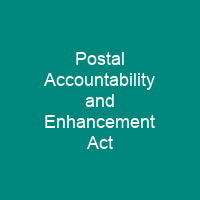The Postal Accountability and Enhancement Act (PAEA) was signed into law by President George W. Bush on December 20, 2006. PAEA was the first major overhaul of the United States Postal Service since 1970. By the end of 2019, the USPS had USD 160. 9 billion in debt, due to growth of the Internet, the Great Recession, and prepaying for employee benefits as stipulated in PAEA.
About Postal Accountability and Enhancement Act in brief

By the end of 2019, the USPS had USD 160. 9 billion in debt, due to growth of the Internet, the Great Recession, and prepaying for employee benefits as stipulated in PAEA. In May 2020, a segment on Last Week Tonight with John Oliver examined the law and its impact on the USPS, demonstrating that it has contributed to its debt.
You want to know more about Postal Accountability and Enhancement Act?
This page is based on the article Postal Accountability and Enhancement Act published in Wikipedia (as of Dec. 19, 2020) and was automatically summarized using artificial intelligence.







